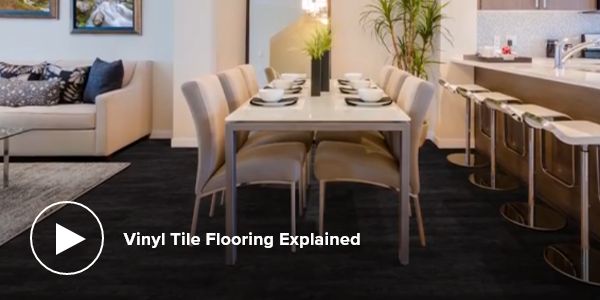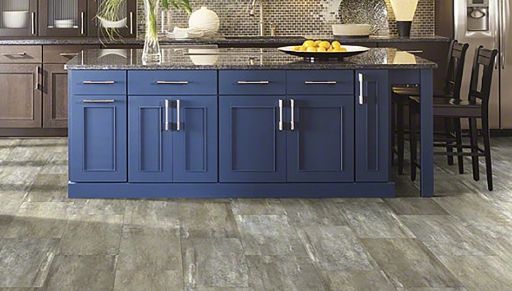Shop Vinyl Tile Flooring
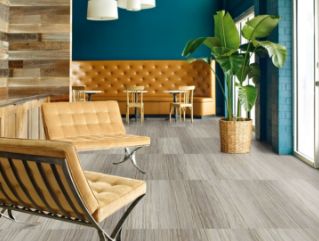
All Vinyl Tiles
- Easy to install
- Lots of colors and looks
- Budget-friendly
Shop All Vinyl Tiles
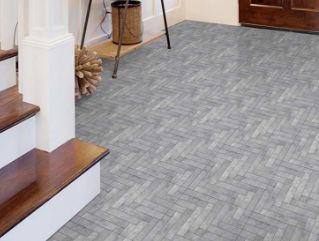
Luxury Vinyl Tiles (LVT)
- Durable and low-maintenance
- High-end visuals
- Water-resistant options
Shop All LVT
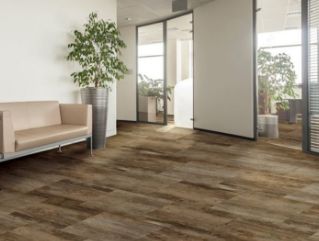
Waterproof Vinyl Tiles
- WPC vinyl
- SPC rigid core vinyl
- 100% waterproof
Shop All Waterproof Vinyl Tiles
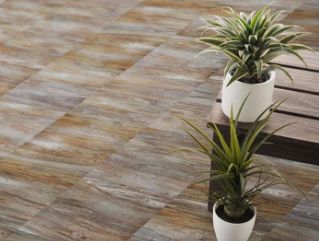
Wood-Look Vinyl Tiles
- High-quality wood grain visuals
- Options for parquet patterns
- Birch, walnut, maple, and other looks
Shop All Wood-Look Vinyl Tiles
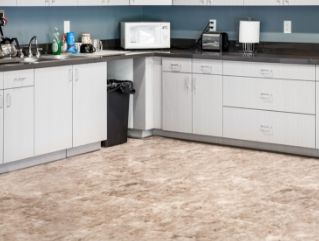
Stone-Look Vinyl Tiles
- Tile-look vinyl options
- Gorgeous natural stone looks
- Marble looks, Italian stone looks, and more
Shop All Stone-Look Vinyl Tiles
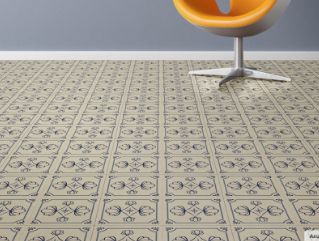
Decorative Vinyl Tiles
- Tons of color options
- Popular patterns and designs
- Mix and match for unique styles
Shop All Decorative Vinyl Tiles
Customer Favorite Vinyl Tile Floors
Vinyl Tile Flooring Reviews
Vinyl Tile Flooring FAQs
Vinyl Tile Flooring Overview
Luxury vinyl tile (LVT) is a durable flooring option made of quality PVC and vinyl. While vinyl floors were once considered cheap-looking, they’re one of the biggest trends in flooring today. They’re now highly sought-after and still budget-friendly.
Vinyl tiles offer a little bit of something for everyone. You can choose from realistic natural textures such as wood and stone, and those beautiful visuals will be protected by a durable wear layer. Best of all, you have the option of a waterproof core.
Vinyl tiles offer a little bit of something for everyone. You can choose from realistic natural textures such as wood and stone, and those beautiful visuals will be protected by a durable wear layer. Best of all, you have the option of a waterproof core.
Vinyl Tile Pros and Cons
What are the benefits of vinyl tile flooring?
- Easy installation: No matter if the tiles are peel and stick, standard, or engineered, they’re designed for simple, DIY installation. Why hire a professional installer when you can do it yourself and save some money?
- Stylish looks: You can find tiles in all the latest styles, so you can keep up with the trends without a problem. Even better, you can express your own unique style with decorative peel and stick tiles.
- Easy to clean: All you need is a vacuum and a mop to keep your vinyl flooring looking great. There’s no need for sanding, staining, or refinishing.
- Affordable: Real stone and wood flooring is expensive. With vinyl tiles, you can benefit from those same beautiful looks without the big price tag.
- Waterproof options: WPC and SPC tiles are 100% waterproof, so you don’t have to worry about water damage in your kitchen or bathroom.
What are the disadvantages of vinyl tile flooring?
- You get what you pay for: Not real stone or wood: This is more of a point of pride for some homeowners. If you want to say you have real stone or wood flooring, then vinyl just isn’t going to cut it, no matter how convincing it looks.
- Not all tiles are waterproof: While you can have your pick of waterproof tiles, not all vinyl tiles share that same total water resistance. You’ll need to shell out a little more money for engineered vinyl like WPC or SPC to get that benefit.
Vinyl Tile Installation Options
There are three main styles of vinyl tile flooring: peel and stick, interlocking, and glue down tiles. Discover which installation method is the best fit for you.
Peel and Stick Vinyl Tiles
Peel and stick vinyl tiles are an excellent DIY flooring option for any medium foot traffic area where you may need a low-cost floor covering. You literally peel the paper off the back of the vinyl tile and stick it to the ground in the place you want it.The only way that the process could be easier would be if the tile peeled and stuck itself - but what would be the fun in that? Available in stone, wood, and checkerboard looks, custom designs can be created with these 12” x 12” tiles to include a splash of color or even a border around the room.
Peel and stick tiles are typically thin and low cost, meaning they aren’t ideal as a permanent flooring solution in a large area that will receive a high amount of foot traffic. If your only concern is money spent and the easiest option possible, these are for you.
Shop Peel and Stick Vinyl Tiles
Interlocking Vinyl Tiles
Interlocking tile flooring is easy to install on your own. The tongue-and-groove edges snap together effortlessly to create a “floating floor” that doesn’t have to be glued or nailed down. This makes interlocking tiles the perfect flooring for a DIY project.Interlocking vinyl tiles are ideal for heavier traffic areas, including all areas of the home and even some commercial use. They can hold up to the wear and tear while staying in place.
Waterproof vinyl tiles use this interlocking system, which helps to seal out water that might otherwise seep between the joints. Because of this, interlocking vinyl tiles are typically more expensive than peels and stick tiles. The upside is that you’re getting a lot more value for your money.
Shop Interlocking Vinyl Tiles
Glue Down Vinyl Tiles
If you need flooring for a commercial space that gets tons of traffic, your best option is to glue the tiles down. This provides the most stability. However, this also means installation is more difficult, and it’s recommended that you hire a professional to get the job done.Some glue down vinyl tiles are also groutable, meaning they’ll look just like tile flooring after you glue them down and apply grout between the joints. If you love the visuals of a tile floor, but you don’t love how cold, rigid, and expensive tile can be, then groutable glue down tiles could be an option for you.
Glue down vinyl tiles aren’t just for commercial use, either. If you really want some extra stability for your flooring at home, this is a good option. Just keep those extra installation costs in mind.
Shop Glue Down Vinyl Tiles
Where to Use Vinyl Tile Flooring
Residential Vinyl Tile Flooring
Vinyl tile floors are a great solution for any room in the home, thanks to the durable PVC or waterproof core construction. It doesn’t matter if you have pets, or rambunctious kids, or both. Vinyl tile will easily hold up to regular wear and tear. If you want a little extra insurance, then waterproof vinyl tiles are your best bet. You can install them in kitchens and bathrooms for a low-maintenance solution.Commercial Vinyl Tile Flooring
Rigid core vinyl tiles are the cream of the crop when it comes to commercial flooring. Designed with a thin, rigid SPC core, rigid core flooring is incredibly durable and 100% waterproof.Business owners gravitate to rigid core for its durable features and its affordable price tag. SPC vinyl tiles come with all the bells and whistles of luxury vinyl flooring, but without the hefty price tag.
Vinyl Tile Flooring Styles
Vinyl tile offers a large selection of colors, textures, and styles, so you can get exactly the look you want in your home or business. Whether your heart’s desire is stone-look or colorful decorative patterns, you can find it in vinyl tile.
Trending Looks
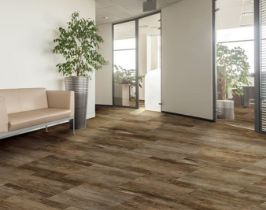
Wood-Look
This is the most popular style on the market, and while it’s typically more common in vinyl plank flooring, you can still find wood-look tiles. Shop Wood-Look Vinyl Tile
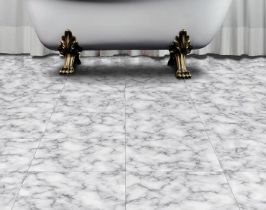
Stone-Look
Stone-look designs are where LVT really excels. The luxury vinyl top layer is able to convincingly mimic the colors and textures of real stone flooring. Shop Stone-Look Vinyl Tile
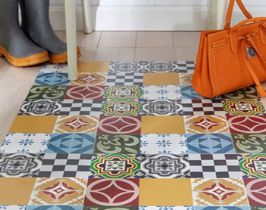
Decorative
If natural looks aren’t your style, consider colorful and creative decorative tile. These tiles are often peel and stick, so you can DIY your own unique pattern. Shop Decorative Vinyl Tile
Trending Colors
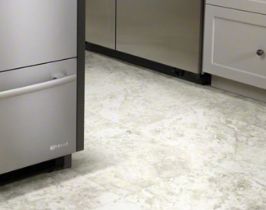
Gray Vinyl Tiles
As the ultimate neutral, gray goes with any room or style. You can install gray flooring knowing you can keep it through restyles and remodels. Shop Gray Vinyl Tiles

High Variation Vinyl Tiles
The high variation look is incredibly popular right now as vinyl continues to mimic the natural colors variations in wood and stone. It’s a bold, stylish look. Shop HIgh Variation Vinyl Tiles
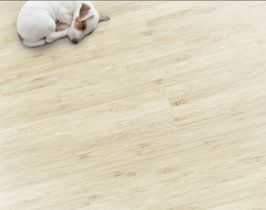
Neutral Vinyl Tile
Sometimes the best option is a more muted or neutral floor that can act as a backdrop to your more adventurous decor and paint colors. Shop Neutral Vinyl Tiles
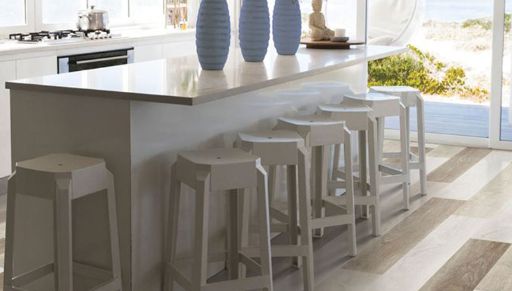
Vinyl vs. Laminate Flooring: Learn the Difference
Ever wondered how vinyl is distinct from laminate? They might look similar, but differences in construction influence their durability and range of use.Learn the difference between vinyl and laminate flooring, the pros and cons of each, and how to make the best decision for your home with our Laminate vs. Vinyl Flooring showdown.
Learn More
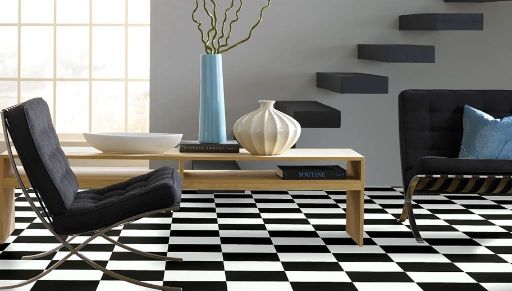
Vinyl vs. Linoleum Flooring: Which is Better?
Some people think linoleum and vinyl are the same thing, and that can lead to confusion while shopping. Modern vinyl floors look far different from the old-school linoleum they once resembled.More importantly, these two floors are constructed differently, so they offer different levels of performance. Discover the crucial differences between linoleum vs. vinyl flooring in this in-depth guide.
Learn More


